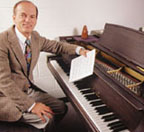UNIVERSITY NEWS
CONTENTS
Construction begins on Transportation Research Center
Aerospace students win design awards
Faculty take lessons to the dorms
Tech research featured in Great Advances report
Survey finds Virginians happy to be here
GM donates $400,000 for projects and scholarships
Kitchen design center installed
Holliday wins ASCAP award
Tech forms center to cut energy consumption
Alcohol 101
Center receives $2 million for sensor research
Hitachi grant to enhance community involvement
Who's in the Class of 2002
DISTINCTIONS

Construction begins on Transportation Research Center
Ground was broken in October for Virginia Tech's Center for Transportation Research (CTR), located near the south Blacksburg terminus of the "smart highway," which is also under construction. The center will study intelligent vehicle/highway systems.
The transportation research center will receive data from video cameras mounted along the highway and fiber-optic sensors built in the road. Some sections of the smart road are due to open by November 1999, and connection to Interstate 81 is projected for 2002.
The building will house working bays for the CTR's two tractor-trailers and five cars. Research faculty offices, a simulator bay, and an asphalt lab will also be located in the 30,000 square-foot building.
Back to Contents
Aerospace students win design awards
Designing strike fighters and a spacecraft on a mission to Jupiter, three teams of Virginia Tech undergraduates from the aerospace and ocean engineering department took national awards in a competition sponsored by the American Institute of Aeronautics and Astronautics (AIAA).
 Virginia Tech teams took both first and third place awards in the undergraduate aircraft design category, which this year required original designs for unmanned strike fighters. The students had to design air combat vehicles that could make 20-degree/per second turns-standard missile evasion maneuvers at an altitude of 40,000 feet and carrying 1,000-pound bombs.
Virginia Tech teams took both first and third place awards in the undergraduate aircraft design category, which this year required original designs for unmanned strike fighters. The students had to design air combat vehicles that could make 20-degree/per second turns-standard missile evasion maneuvers at an altitude of 40,000 feet and carrying 1,000-pound bombs.
Another team placed second in the undergraduate space design competition, designing a spacecraft that could perform an information gathering mission to Europa, one of Jupiter's moons. The craft was designed to orbit Europa, land, and collect surface data.
Virginia Tech teams have performed well in the AIAA competitions, winning awards in six out of the past nine years.
Back to Contents
Faculty take lessons to the dorms
Residence halls are now places to learn more about topics ranging from investment strategies and time management to sexual assault prevention and communications. A program started by Virginia Tech's residential and dining division is now taking those topics and more home to students--literally.
More than 75 faculty and staff members have volunteered to share expertise and skills outside the classroom at residence hall events. "These faculty and staff members have demonstrated a desire to make the entire university a classroom," says Gerry Kowalski, director of residence education for Residential and Dining Programs.
Many of the faculty members are staying within their areas of study; for example, David Ford, vice provost in academic affairs, is offering talks on "academic success in any college/university environment." Horticulture professor Jerry Williams offers both "gardening: why it's good for you" and "developing your social skills."
Back to Contents
Tech research featured in Great Advances report
Four Virginia Tech research projects were featured recently in a Great Advances report released by the Science Coalition for the Science Committee of the U.S. House of Representatives.
The advances chosen to be among the Science Coalitions report were:
- A simulation that demonstrates how to reduce automobile emissions. The simulation examines second-by-second changes in individual vehicle speeds and accelerations for drivers within areas the size of entire metropolitan areas.
- Software that will make it possible for cell phones to have position indicators and internal maps. Radio signal data is tied to satellite maps, resulting in site-specific prediction of signal strength and clarity around structures and geographic features.
- Tobacco engineered to produce human pharmaceuticals. Tech scientists have introduced into the tobacco genes snippets of human DNA that instruct the plant to produce human protein, which can then be extracted from the leaves and used to create drugs.
- A sensor that detects biological warfare agents at trace levels. A novel sensor is now capable of identifying the figurative "needle in a haystack." The device produces results that are 20 times more powerful than previous sensing devices.
Each year, the Science Coalition releases a Great Advances report designed to educate the American public on the innovations in scientific research conducted at our nation's leading research universities.
Back to Contents
Survey finds Virginians happy to be here
The majority of Virginians feel their state is a good place to live and are happy with their jobs, community services, families, and friends, according to a survey by the Virginia Tech Center for Survey Research.
In fact, 86 percent of Virginians rate the commonwealth as an excellent or good place to live.
The survey, however, showed disparities between the attitudes of those living in the urban crescent between Northern Virginia and Virginia Beach and the rest of the state. In the urban crescent, 13 percent more people thought Virginia was an easy place to find a job, but a lower percentage of these urbanites thought housing was reasonably priced (55 percent compared to 65 percent).
According to the survey, most Virginia residents favor sex education and abortion rights. The survey found that 77 percent of Virginians support providing sex education in public schools. Each year, Virginians have been asked about a woman's right to have an abortion, and 70 percent support that right.
Significantly fewer residents perceive an increase in crime in their community--30 percent, down from 41 percent in 1997.
Surveyors completed 726 interviews to provide a representative sample of households across Virginia with a margin of error of about 3.8 percent.
Back to Contents
GM donates $400,000 for projects and scholarships
General Motors (GM) is giving $400,000 to the Virginia Tech College of Engineering to support undergraduate design projects and to continue the company's funding for minority and women students.
GM has contributed more than $2 million in equipment and cash to the College of Engineering, including a recent grant providing $250,000 to fund Smart Road research and minority engineering student involvement.
GM's latest gift will provide $300,000 for equipment and resources for three areas the Advanced Engineering Laboratory, the Engineering Design Laboratory, and the Virtual Corporations Program. Two Virtual Corporations will receive GM support: PERTS, which entails the design of a magnetic levitation rail system for personal vehicles, and the Distributed Information Systems Corporation, a computer-network based information storage system to access medical data for the Virginia-Maryland Regional College of Veterinary Medicine.
An additional $100,000 will be donated for scholarships and fellowships for minority and women students.
Back to Contents
Kitchen design center installed
 Virginia Tech has teamed with 22 corporate donors to build the Center for Real Life Kitchen Design in Wallace Hall.
Virginia Tech has teamed with 22 corporate donors to build the Center for Real Life Kitchen Design in Wallace Hall.
The new center is a classroom surrounded by five working kitchens: a gourmet kitchen, a family kitchen, a contemporary kitchen, a starter kitchen, and a real-life design kitchen.
Julia Beamish, coordinator of the kitchen and bath-design specialization, says the students will use the kitchens to learn the parameters of space requirements and appliance needs.
The centerpiece is the real-life design kitchen, a model of the latest advances in accessibility, making the room accommodating for persons with disabilities. Beamish says the kitchen will be part of the instruction in a barrier-free class on real-life design. The sink and range are adjustable, making them accessible to someone in a wheelchair, and ridges on the countertops provide orientation cues for the blind.
Back to Contents
Holliday wins ASCAP award
 Kent Holliday of Virginia Tech's music department in the School of the Arts has received an ASCAP Award from the American Society of Composers, Authors and Publishers.
Kent Holliday of Virginia Tech's music department in the School of the Arts has received an ASCAP Award from the American Society of Composers, Authors and Publishers.
The award is designed to assist composers of serious music. Awards are "based on the unique prestige value of the writer's catalog of original compositions, as well as recent performances of works in areas not surveyed by the society," according to Marilyn Bergman, president and chairman of the board of ASCAP.
Holliday usually writes chamber music for either solo piano or for small ensembles. He was selected as winner of the 1996 Virginia Music Teacher's Association/Music Teachers National Association Commissioned Composer Competition and won the New Music Delaware Competition the same year.
Back to Contents
Tech forms center to cut energy consumption
Virginia Tech soon may have a hand in reducing the nation's electricity consumption.
With support of more than $12.35 million from outside sources, Tech is launching an Engineering Research Center designed to "make the United States the most efficient user of electrical energy in the world," according to electrical engineering professor Fred Lee, who submitted a proposal for the center to the National Science Foundation (NSF).
Electronic equipment accounts for more than 60 percent of the total electric power used in this nation. The goal of this project is to cut that usage by 30 percent. Most of the research will focus on industrial uses, such as robots and other automation, but consumer applications for everything from computers to air conditioners will figure into the research.
Lee submitted the proposal on behalf of a consortium of five schools headed by Tech: University of Wisconsin-Madison, Rensselaer Polytechnic Institute, North Carolina A&T University, and the University of Puerto Rico.
Funding has come from government, industry, and the NSF to establish the center. Virginia Gov. James Gilmore has pledged $1.5 million to the project, and more than 100 industrial allies--including Motorola, GM, Rockwell's Allen-Bradley Division, and York International--have added to the total budget.
Back to Contents
Alcohol 101
Along with any serious mistake comes the wish to relive the event and make a better choice. Among college-aged students, mistakes often involve alcohol.
"Alcohol 101" is a first-of-its-kind, interactive CD developed by the University of Illinois at Urbana-Champaign and the Century Council that allows students to simulate the consequences of their drinking decisions. Virginia Tech distributed the CD to all on-campus students. To reinforce the message, Attorney General Mark Earley came to campus to address the freshman class about the dangers and legal ramifications of both binge and underage drinking.
The CD can be thought of as a "flight simulator" for the college party scene. It gives guidance on how to make responsible decisions about drinking or not drinking, and shows students how to stay in control in situations involving alcohol. By placing students in a "virtual party", they can simulate the consequences--right or wrong--of different choices and behaviors.
The program deals realistically with the topic, and presents the dangers of alcohol abuse/underage drinking, driving while intoxicated, alcohol overdose, and unsafe or regretted sex.
The CD also presents support for not drinking as a viable and socially acceptable alternative.
Back to Contents
Center receives $2 million for sensor research
The U.S. Department of Energy (DOE) awarded a $2 million grant to the Virginia Tech Fiber and Electro-optics Research Center for technology that will improve collection methods in subterranean oil fields. Fiber optics will allow sensors to be sent "downhole" and return data on temperature, pressure, flow and fluid waves more reliably and with greater detail, allowing for maximum returns from each field.
Anbo Wang will be the chief researcher, building on breakthroughs the center made in the optical-fiber sensor field. The DOE awarded the grant to develop technology that will allow oil to be produced more efficiently while maintaining low wholesale prices.
Back to Contents
Hitachi grant to enhance community involvement
Although community involvement in public schools is critical, this involvement is declining; but a recently funded program at Virginia Tech may provide crucial research and intervention to increase community participation.
The Hitachi Foundation, through its Role of Information Technology in Education Initiative, has awarded a $99,656 grant to the Department of Computer Science for its project called Facilitating the Community as a Learning Community, which will expand and improve the Blacksburg Electronic Village (BEV) community network. The goal is to improve the current network model in ways that will increase community involvement in K-12 education, according to John Carroll, professor and one of the principal investigators along with Mary Beth Rosson. Partner organizations include the Town of Blacksburg, the BEV Seniors, the Montgomery-Floyd Public Library, and the Montgomery County Public School System.
The researchers will implement a Web-based multi-user domain (MUD) for accessing the hypertext information of the BEV, including Web projects created by K-12 students. MUDs allow thousands of computer users to interact simultaneously and get immediate responses. The project will develop, implement, and investigate educational activities that involve real-time collaboration with community members and activities that engage citizens on matters of community interest.
Blacksburg will use the MUD to elicit broader citizen participation and comment than occurs through in-person town meetings. Activities include community planning sessions, software design and testing, teacher training, use analysis, troubleshooting, and evaluation.
Back to Contents
Who's in the Class of 2002
This fall's first-year students have come overwhelmingly from Virginia; that's no surprise. Seventy-two percent of Virginia Tech's Class of 2002 hail from the commonwealth. The rest come from 42 other states and 48 countries, including Mongolia, Ethiopia, Kenya, and Ghana.
The Class of 2002, almost 4,700 strong, is one of the best prepared academically. The average combined SAT score is 1,167, and the average high school GPA is 3.5. These statistics are about the same for the Class of 2001. About 55 percent of the freshman class receive some sort of financial aid, and this year's class is the first to enter Tech with a computer requirement.
The days when male students vastly outnumbered females on the Tech campus are long gone--the Class of '02 is 42 percent female.
Back to Contents
DISTINCTIONS
Highly ranked alumni
As Tech enters its 126th year of military tradition, at least 86 alumni have achieved general or admiral rank. They include: one four-star general, Gen. Thomas Richards '56; eight lieutenant generals, 24 major generals, and eight rear admirals. A slight majority of officers served in the U.S. Army (48), with 29 in the Air Force, six in the Navy, two in the U.S. Coast Guard, and one in the U.S. Marine Corps.
Wellness living unit cited
The W.E.L.L. (Wellness Environment for Living and Learning), a substance-free living environment in West Ambler Johnston for students interested in the various dimensions of wellness, was cited in June by two higher education groups as one of the 20 best examples of collaborative learning programs (between academic affairs and student affairs) in the nation.
Tech still a good buy
Virginia Tech was rated among 25 "best values" in four-year, public colleges and universities ranked by Kiplinger's Personal Finance Magazine in August. Tech was ranked 16th and praised because it is affordable and productive.
Back to Contents
Home | News | Features | Research | Philanthropy | President's Message | Alumni | Classnotes | Editor's Page


 Virginia Tech teams took both first and third place awards in the undergraduate aircraft design category, which this year required original designs for unmanned strike fighters. The students had to design air combat vehicles that could make 20-degree/per second turns-standard missile evasion maneuvers at an altitude of 40,000 feet and carrying 1,000-pound bombs.
Virginia Tech teams took both first and third place awards in the undergraduate aircraft design category, which this year required original designs for unmanned strike fighters. The students had to design air combat vehicles that could make 20-degree/per second turns-standard missile evasion maneuvers at an altitude of 40,000 feet and carrying 1,000-pound bombs. Virginia Tech has teamed with 22 corporate donors to build the Center for Real Life Kitchen Design in Wallace Hall.
Virginia Tech has teamed with 22 corporate donors to build the Center for Real Life Kitchen Design in Wallace Hall. Kent Holliday of Virginia Tech's music department in the School of the Arts has received an ASCAP Award from the American Society of Composers, Authors and Publishers.
Kent Holliday of Virginia Tech's music department in the School of the Arts has received an ASCAP Award from the American Society of Composers, Authors and Publishers.